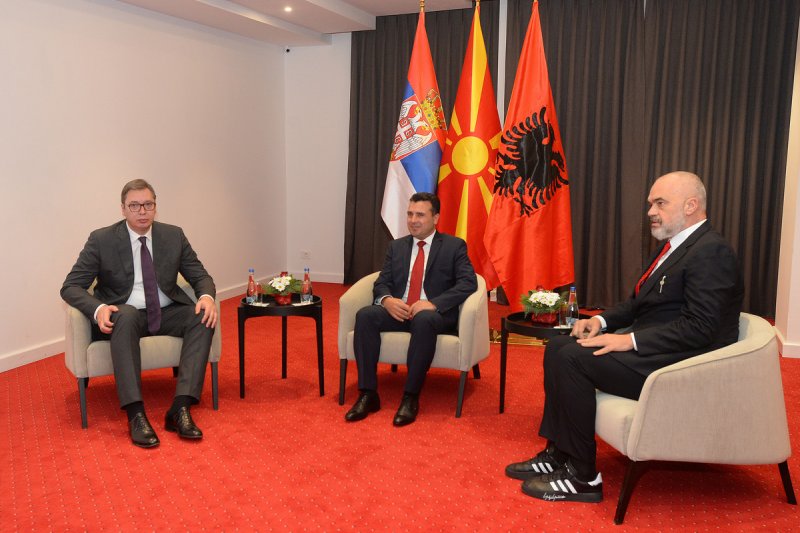The Balkans' Post-Communist Mafia States
Membership of the Western Balkans has been an official EU policy since 2003. Germany supports the enlargement process. But where are we today, almost twenty years after Thessaloniki Summit and in the era of the corona pandemic?
Montenegro and Serbia are in accession negotiations with the European Union. In March, it was agreed to start negotiations with Northern Macedonia and Albania. Bosnia and Herzegovina has submitted an application for membership, and Serbia is blocking any progress by Kosovo.
This is one side of the enlargement process. But how are things with the values ​​advocated: democracy, the rule of law and sustainable development in practice?
There has been "progress" since 1989, although it has been slowed by wars during the break-up of Yugoslavia. With the exception of Kosovo, there is freedom of travel for the "Western Balkans Six", which citizens use to see where they will emigrate.
In the supermarket chains, which are mostly in German hands, you can primarily find imported items, and there are hardly any domestic products. Corrupt construction projects, construction of small hydropower plants, deforestation, land theft and uncontrolled tourism development are damaging the unique nature of the region.
Education and health are at a terribly low level, unemployment is huge. Many would not be able to survive without the money coming to them from abroad and the very present gray economy. It is time to say that the neoliberal transition in the Balkans has failed.
The very low turnout in the elections in Serbia, Croatia and North Macedonia is an expression of deep distrust in democracy. The demonstrations in Belgrade disrupted the "brilliant" election victory of the ruling party of President Aleksandar Vucic.
North Macedonia, after a dirty election campaign, is facing an almost impossible government formation. Katica Janeva, a former hopeful and special state prosecutor, has been charged with corruption. At the same time, Sasho Mijalkov, a former head of the secret service and a cousin of former Prime Minister Gruevski, once a terrible Capo di Capi and one of the richest entrepreneurs, is scurrying around Skopje. Nikola Gruevski enjoys all his wealth in exile in Budapest.
Bosnia and Herzegovina is a country that is impossible to rule, where everything that is valuable is shared by elites led by kleptocrats like Milorad Dodik and Bakir Izetbegovic.
Albania and Kosovo are in constant crisis mode. Kosovo's elected prime minister, Albin Kurti, was overthrown by US intrigue, and Kosovo President Hashim Thaci is facing a war crimes indictment, which Albanian Prime Minister Edi Rama sees as an attack on all Albanians.
Little Montenegro, where elections are being held in September, is divided by an absurd dispute over the law on freedom of religion between the ultra-reactionary Serbian Orthodox Church and the clique gathered around longtime ruler Milo Djukanovic.
And then who is surprised that billions of the European Union, the European Bank for Reconstruction and Development, the World Bank, the International Monetary Fund and other organizations are disappearing?
Since 1989, hybrid democracies, kleptocracies and mafia states have been established. Serbian-born economist Branko Milanovic wrote on his blog about "multi-party kleptocracies"; political scientist Jasmin Mujanović described it in his book "Hunger and Anger" as "elastic authoritarianism"; In the current study, the chairman of Transparency International in BiH, Srdjan Blagovcanin, talks about the "rule of the cartel". Vedran Džihić from the Austrian Institute for Foreign Policy says that the elections in Serbia were about "false democracy and the art of illusion".
Unfortunately, the situation does not look any better in some European Union countries either. They were only lucky to become members of the club in time, such as Romania and Bulgaria, Malta, Cyprus, Hungary and Poland. In 2016, the Hungarian sociologist Balint Magyar described his country as a "post-communist mafia state". His criteria can be replicated in the "six of the Western Balkans".
Brussels decision-makers and their bureaucracy, due to other priorities, do not care about that at all. But it really doesn't make much sense to warn the Balkans to stick to the "basic rules" of reform, when EU countries, as well as Germany, really care about the rules as soon as it touches their interests.
European party alliances, and in particular the European People's Party and the Party of European Socialists, play a dangerous role in arrangements with kleptocracies in the Balkans. Because, it is simply wrong to label the Balkan parties as conservative, Christian, liberal, social democratic or socialist, and thus classify them into party families.
The so-called Berlin Process, which began in 2014 with a lot of enthusiasm and good prospects, did not produce anything special; it was that famous mountain was shaking, a mouse was born. However, the Regional Youth Cooperation Office (RYCO), which was almost the only concrete result of the process, should not be devalued. Because, it can thank her existence to the engaged representatives of the civil society.
Aspirations for infrastructure projects have remained on paper, while China is building highways, rail networks and bridges, sometimes even with EU support, and luring countries into a debt trap. The sustainability of these projects is something else entirely. But they fit perfectly to "spin" many millions.
So, all in all, it seems that neither the Balkan elites nor their European partners are interested in working on sustainable development, adapted to climate change and endangered biodiversity.
Therefore, it is high time to fundamentally reconsider the European Union's policy towards the Balkans. This will not be regulated by a new "methodology" of EU accession. Corrupt elites in politics and the economy must be opposed. They would have to invoke personal responsibility. And this can only be done in cooperation with, albeit weak, but diverse and vibrant civil society.
Because, as long as young people are offered the opportunity between adjustment and emigration, the exodus of the well-educated will not be able to be stopped. Finally, it is necessary to have the courage, both in Brussels, and in Berlin and Paris, to talk openly with the Balkan elites. But it also calls for naming one's own deficits and fighting them. Because the status quo is fatal. / DW
*Gudrun Steinacker, spent 13 years in the Balkans between 1976 and 2016, eventually as Germany's ambassador to Northern Macedonia and Montenegro














